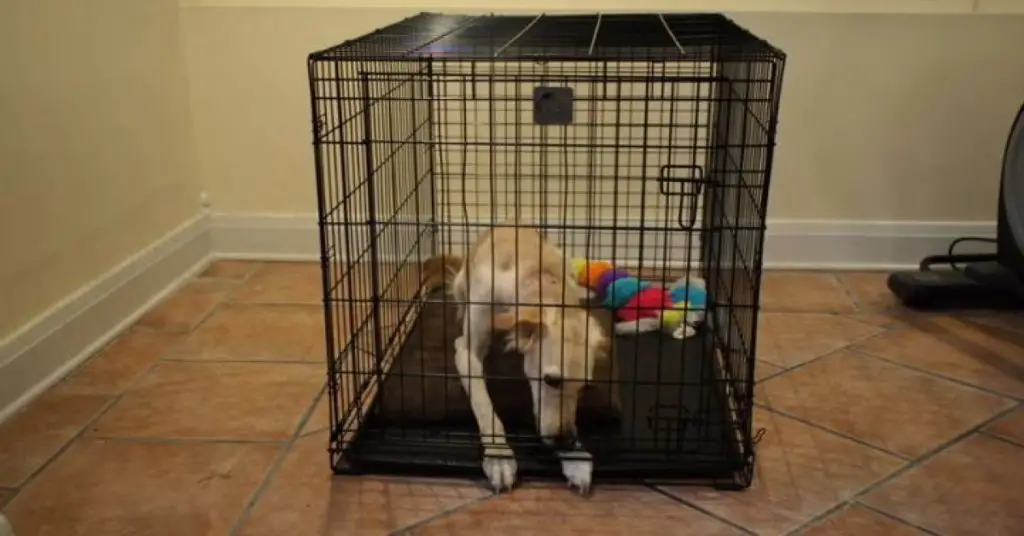
Dogs may scratch their crate at night due to instinctual denning behavior, seeking a cozy and secure sleeping environment. It can also be a sign of anxiety or stress, particularly if they feel isolated or have separation anxiety. Lack of exercise or mental stimulation during the day may contribute to restlessness at night.
Uncomfortable sleeping conditions or physical discomfort could be another factor. Improper crate training or negative associations with the crate can also lead to scratching behavior. Identifying the underlying cause and addressing it through proper training, exercise, and a comfortable environment can help reduce this behavior.
Why does My Dog Scratch her Cage at Night?
Instinctual Denning Behavior
Dogs have a natural inclination to seek out small, enclosed spaces resembling dens. Scratching at the crate may stem from their instinctual behavior to create a cozy and secure sleeping environment. By scratching, they may be attempting to burrow or nestle down to find comfort and security.
Anxiety or Stress
Anxiety or stress can trigger a dog to engage in repetitive behaviors, including scratching the crate. Dogs are social animals, and being confined to a crate at night can cause feelings of isolation, fear, or separation anxiety. Scratching may be an outlet for their pent-up energy or a way to alleviate anxiety by engaging in a repetitive motion.
Lack of Exercise or Mental Stimulation
Insufficient physical exercise and mental stimulation during the day can lead to restlessness and boredom at night. Dogs may resort to scratching their crate as a means of self-entertainment or to release excess energy. Providing adequate exercise and mental enrichment throughout the day can help reduce this behavior.
Uncomfortable Sleeping Environment
Scratching the crate may indicate that your dog is uncomfortable or experiencing physical discomfort. Check for any signs of allergies, skin irritations, fleas, or other parasites that could be causing itchiness or discomfort. Ensure that the bedding in the crate is clean, appropriate for your dog’s needs, and provides sufficient cushioning and warmth.
Lack of Proper Crate Training
Improper crate training or negative associations with the crate can contribute to scratching behavior. If your dog has had negative experiences in the crate, such as being confined for long periods or using it as a form of punishment, they may scratch as a way to express their displeasure or anxiety about being confined.
Solutions
Gradual Crate Acclimation
Reintroduce your dog to the crate using positive reinforcement techniques. Make the crate a positive and rewarding space by associating it with treats, toys, and comfortable bedding. Gradually increase crate time and provide breaks, ensuring your dog associates the crate with positive experiences.
Increase Exercise and Mental Stimulation
Ensure your dog receives enough physical exercise and mental stimulation during the day to tire them out before bedtime. Engage in activities such as walks, playtime, puzzle toys, and training sessions to keep them mentally and physically active.
Provide a Calming Environment
Create a soothing environment around the crate to promote relaxation. Use calming music, pheromone diffusers, or a cozy blanket to help your dog feel secure and comfortable.
Consult a Veterinarian or Professional Trainer
If the scratching behavior persists or worsens despite your efforts, it’s advisable to consult a veterinarian or professional dog trainer. They can assess your dog’s specific situation and provide tailored advice or suggest behavioral modification techniques to address the underlying causes.
Final Words
Scratching the crate at night can be attributed to various factors such as instinctual denning behavior, anxiety, lack of exercise, discomfort, or improper crate training. Understanding the root cause of the behavior is crucial for implementing appropriate solutions.
By gradually acclimating your dog to the crate, providing ample exercise and mental stimulation, and ensuring a comfortable sleeping environment, you can help alleviate the scratching behavior and promote a peaceful night’s sleep for both you and your beloved canine companion.